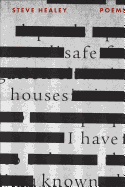
In his third poetry collection, Steve Healey (10 Mississippi) recalls events from his life in explorations of surveillance and stability. Healey lays bare his silent turmoil as his father reveals his identity as a spy for the CIA ("I listened/ to my father but didn't say/ anything. I forgot I was there") and as his parents' marriage unravels ("I couldn't feel my body anymore/ there was a war going on/ I was trying not to be a problem"). His sense of shrinking significance reappears in "Spectral Evidence," the speaker noting, "Sometimes I put blush on my cheeks," perhaps to look more alive than he feels. Similarly, images of blood repeat over a dozen times--"I cut myself to remove the dirty part of my body,/ but I was surprised by how much I could bleed"--while juxtapositions of life and death show the ways both compete.
Healey evokes a sense of spiraling through variations on the villanelle and descriptions of "going around and around." In tandem with this dizziness is the overarching idea of the watcher and the watched, with one haiku asking, "Can you see the eyes that see/ you through swirling snowflakes?" The reader is again implicated in "Self-Surveillance": "You press the shutter button/ and fall for the first time. You get up/ and continue." Mirrors, binoculars, windows and eyes enhance this atmosphere of exposure, making an early poem's question "What does the word 'safe' mean to you?" haunt. Through clever wordplay, Safe Houses I Have Known aptly conjures the terror of a world where everyone watches everyone. --Samantha Zaboski, freelance editor and reviewer

